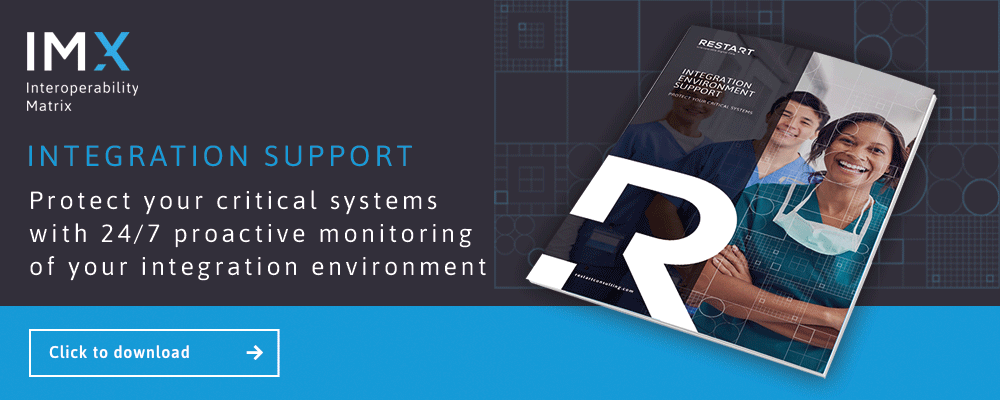Adding Customer Visibility to IMX Integration Support
Over the past decade, integration engines have become a critical component within many hospital trusts’ interoperability strategies, underpinning the collaboration that is the priority for health and care providers. For clinicians, Trust Integration Engines (TIEs) are the foundation for rapid, single sign-on access to patient information that has eradicated time-wasting, avoided the need to duplicate tests and enable more time to care. These systems have become critical, which means any downtime is hugely disruptive. Integration support – the way these essential integration engines are supported and maintained has become a priority for Trusts.

Paul Hurley, Software Engineer, ReStart
For ReStart, integration support has always been a priority. It’s the reason we developed our ReStart Alert Monitoring (RAM) support monitoring tool ten years ago and why we have a dedicated IMX Support team with many decades’ experience behind them. We are now extending access to RAM dashboards to our hospital trust customers to give them a real-time, graphical view of the status and performance of their TIEs at all times.
To understand what differentiates ReStart’s approach to support, we spoke to Paul Hurley, one of our dedicated software engineers – he has nearly forty years of experience in the software industry and has been with the ReStart team for eight of those years.
RAM history – interoperability monitoring tool
RAM is a core component of the IMX Support model. Ten years ago, several Trusts approached ReStart to provide out-of-hours support for their integration engines – and having looked at the options, we decided the best way to support the multiple different TIEs in use across the NHS would be to develop our own monitoring software in house. Initially created by Sean Connelly, a Principal Architect at ReStart and George Gray, our Technical Lead. RAM is an interoperability monitoring tool that can monitor InterSystems (Ensemble, Health Connect), Mirth, Rhapsody, QVera, and extend to any other integration environment.
RAM proactively monitors all in-scope systems and interfaces across all our TIE customers – tracking system heartbeats, message throughput, queues or errors, system connectivity and uptime. We track the status of each TIE using a colour-coded dashboard displayed on giant screens in the IMX Support centre. The dashboard is also available to our support team on desktop, tablet and mobile to ensure they have 24×7 access from any location.
One of Paul’s tasks has been to enhance RAM, with additional input from our IMX Support superstar Paul Seddon, who knows RAM inside out. With this latest version – RAM 3 – we have added a client dashboard that can provide each Trust with a highly intuitive and simple to use overview of its TIE’s performance.
As Paul Hurley explains, “We’ve always provided Trusts with a monthly status report as well as regular email updates about alerts. Recently, as the vital role of a TIE within a Trust has increased, some customers have requested their own view of the TIE’s performance. We have created a new RAM User Interface, with dedicated graphical client dashboards that show each Trust a simple and immediate view of how the TIE is performing.”

Hospital trust integration support environment view
The secure system runs in the cloud from the ReStart webserver, that can provide authorised Trust IT staff with continuous access to the high-level status of their TIE performance dashboard from any location. In addition to having immediate visibility of any problems that need urgent resolution, a Trust can also follow any minor issues raised on various interfaces. Some Trusts will opt to track and investigate the patterns internally. Others will enjoy the comfort factor of seeing these patterns during support discussions with ReStart’s IMX Support team.
As Paul Hurley says, “Over the past decade Trusts have come to rely significantly on TIEs – indeed, a TIE has become a vital component of the overall integration strategy which is why Trusts increasingly want to see how this critical piece of infrastructure is performing at any time. As Trusts now start to interconnect with regional groups and partnerships, with wider data sharing across the health area, the real-time monitoring provided by RAM will become ever more valuable.”
Rapid access to Trust Integration Engine (TIE) information
In recent years Paul has seen the growing complexity of TIEs throughout the NHS, with Trusts adding more interfaces and data types, including documents. TIE failure is a rare occurrence due to the use of mirrored or clustered failover. However, if one does fail, as many as 40 systems could stop receiving clinical documents, demographics, registrations, appointments and referrals. The resultant impact is a huge manual effort to mitigate the risks associated with a delayed data update.
This additional complexity is encouraging many Trusts to look again at the way the TIE is supported. At ReStart we offer a flexible IMX Support model – from 100% 24×7 support to those Trusts with no in-house support team but perhaps a dedicated TIE manager, to out-of-hours only support. For Trusts that undertake their own support, the additional functionality in RAM will also be useful, especially given the ease of implementation. Monitoring right down to server level, RAM can be installed remotely. As soon as the Trust undertakes the required firewall configuration, RAM can be up and running within a matter of an hour or two, providing instant information about TIE status.
ReStart’s integration support, skills, experience and commitment
RAM is just one part of the overall ReStart commitment to top-quality IMX Support for its customers. One of the most significant differences in our approach is that support is not seen as a stepping stone to a different role: IMX Support is a critical and much sought after job! Hurley says, “Our Help Desk Supervisor Paul Seddon has been at ReStart for a decade – and anyone who has worked with him knows not only how incredibly skilled he is in support, TIEs and RAM but also his commitment to our customers and the NHS.”
In fact, the entire IMX team is fascinated by the data provided by real-time monitoring and how it can be used to transform immediate support and improve the overall performance of a TIE. Paul Hurley says, “I have around 40 years IT experience, and having worked on database monitoring at the highest and deepest level for Oracle. With a mathematics background, I am very interested in the metrics and what they tell us about the systems.”
ReStart is continuously tracking the information provided by RAM to highlight potential problems. For example, for a mirrored TIE, a frequent failover between systems won’t affect end-users, but it does suggest a potential problem – such as a lack of disc space, which can be investigated and remediated before a more serious issue arises. A data quality issue that is causing network communication problems with one system will prompt a series of alerts. By investigating and modifying the TIE interfaces, the IMX Support team can ensure data quality.
As Paul says, “We are passionate about what we do. We are not just people who decided to give this a go – support is something that is so central and core to our business.”
Committed to supporting the NHS
Demand for ReStart’s IMX Support services continues to grow for several reasons. Customers appreciate our responsiveness no matter what hour of the day or night they need us. Every person at ReStart who investigates an integration support issue is an expert, and confidence in their ability is unquestionable by NHS staff. ReStart’s IMX Support team is genuinely committed to knowledge transfer and sharing technical insights with customers to help them understand their own systems.
This is not just about technical know-how. The IMX Support team’s skills and expertise within the NHS are also key to delivering the quality of support. Paul says, “We are not just passionate about the software but also about the NHS. There are plenty of places you can go and work with our technical backgrounds, but it is about enjoying work and giving something back. We are not frontline NHS staff, but in helping to keep NHS data resources up and running, we feel like we are doing a small thing, a good thing.”
For more information about our support, please visit our IMX Support page, and download our support brochure. If you have any questions, or would like to discuss how we could support your integration environment, please get in touch.


